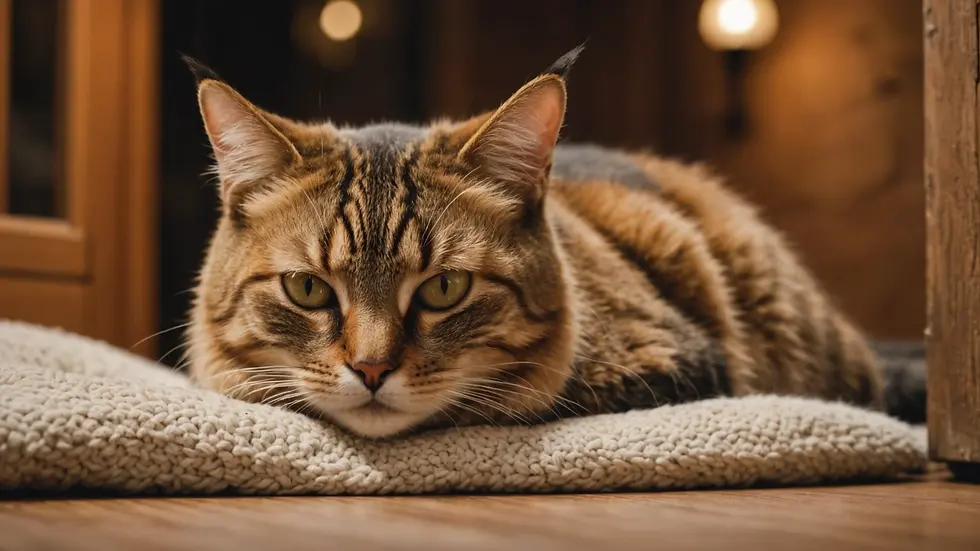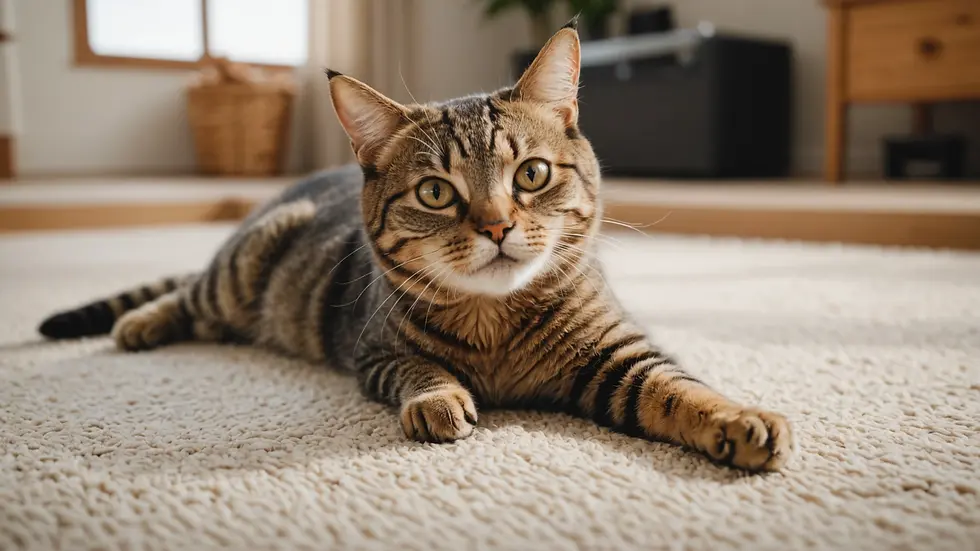Why Does Your Feline Friend Need So Much Beauty Sleep? Demystifying Your Cat's Mysterious Snooze Sessions
- Jyotiraj Borah
- Feb 7
- 5 min read
Cats are often seen lounging around the house, napping in sunbeams, or curled up in the most unlikely of places. If you’ve ever wondered, “Why does my cat sleep so much?” you’re not alone. Understanding feline sleep patterns can provide insight into your cat’s health and behavior. This post explores the reasons behind your cat’s extensive napping and what it means for their overall well-being.
Understanding the Basics of Cat Sleep
Just like humans, cats experience different stages of sleep, including light and deep sleep. Cats commonly sleep between 12 to 16 hours a day, with some breeds, like the Persian, napping even up to 20 hours. This extended sleep is crucial for their recovery and energy conservation.
Cats are crepuscular, meaning they are most active during dawn and dusk. This behavior traces back to their ancestors, who thrived as hunters thanks to their ability to stalk prey during these times.
This impressive amount of sleep is completely normal and essential for a cat’s health.
Why Do Cats Sleep So Much?
Cats are incredibly well-adapted for their environment. Their ancestors were solitary hunters who had to save energy for intense activity. Here are the primary reasons your feline spends so much time snoozing:
Energy Conservation
Cats are natural predators. They are built for short bursts of high-energy action, like chasing after prey. By sleeping for long periods, they conserve energy that they can later use for those sudden bursts of activity. For example, when a cat is suddenly triggered by a moving toy or a bug, it can leap into action in a split second.
Age Matters
The age of your cat can greatly influence their sleep habits. Kittens sleep more than adult cats, often reaching up to 20 hours a day. This sleep is vital for their growth and tissue development. On the other hand, older cats may also sleep more due to fatigue or slowed metabolism. Generally, as cats age, they may need additional sleep compared to their younger selves.
Health Considerations
Increased sleepiness can sometimes indicate health issues. If your cat is suddenly sleeping more or behaving differently, it’s essential to consult a veterinarian. Common issues like obesity or arthritis can make movement more strenuous, leading to more time spent sleeping.
Environmental Factors
Cats are sensitive to their surroundings. Conditions such as temperature, noise, and comfort significantly influence their sleep. A calm, cozy environment encourages deeper relaxation. Conversely, loud noises or interruptions can lead to restless sleep. For instance, a well-placed cat bed away from traffic can make a difference in their napping quality.
The Science Behind Cat Sleep Patterns
Understanding your cat’s sleep science can offer additional insights into their unique behaviors. Cats have what is termed a "polyphasic" sleep cycle, meaning they engage in multiple sleep bouts throughout each day.
REM Sleep
Like humans, cats experience Rapid Eye Movement (REM) sleep. This stage is important for cognitive functions and emotional health. During REM sleep, you may notice your cat twitching, purring, or moving its paws, indicating it is dreaming. This dreaming phase is vital; studies suggest that a well-rested cat excels in problem-solving and emotional regulation, which can be useful during playtime.
Napping Patterns
Cats prefer several short naps instead of long stretches of sleep. This aligns with their predatory behaviors, allowing them to stay alert even while resting. While they may appear deeply asleep, they can spring into action at a moment's notice if they sense danger or see something intriguing.
Recognizing Healthy Sleep Patterns
As a cat owner, it’s crucial to recognize what makes up healthy sleep patterns. Although each cat is different, some indicators can help you understand if your cat's sleep is on point.
Signs of Healthy Sleep
Regularity: Cats have predictable sleep patterns. Consistency in their sleep schedule is a positive sign of health.
Energy Levels: A healthy cat will wake up energetic and curious after a nap, showing that their sleep was restorative.
Normal Behavior: Your cat should display typical behaviors when awake. This includes playing, grooming, and interacting with family members.
If you notice any deviations in your cat's sleeping habits, it may be worthwhile to schedule a vet appointment.
The Benefits of Sleep for Cats
Sleep is not just a time-out; it's critical to your cat's health. Here are some benefits associated with getting enough rest:
Physical Health
Sleep plays a pivotal role in your cat’s physical well-being. During deep sleep, the body engages in repair and recovery. This process strengthens the immune system, crucial for fighting off illnesses.
Mental Well-being
A well-rested cat tends to have a better mood and overall behavior. Sleep enhances their intelligence and instincts, keeping them sharp and alert, which is vital in a domestic environment.
Stress Reduction
Like humans, cats can feel stress. Adequate sleep can help reduce anxiety and promote a calm environment for your feline friend.
Creating a Sleep-Friendly Environment for Your Cat
To improve your cat’s sleep quality, consider creating a more inviting environment. Here are some suggestions:
Comfy Sleeping Spots
Cats love cozy places to snooze. Providing multiple soft spots around your home, such as cat beds with plush blankets, can help your cat feel secure and comfortable.
Quiet Spaces
Ensure your cat has a quiet retreat for undisturbed sleep. This could be a peaceful room or a designated corner that is free from daily activity.
Regular Playtime
Establishing regular play sessions can help your cat expend energy during the day. The more energy they burn, the more likely they are to enjoy quality sleep.
Common Misconceptions about Cat Sleep
There are many myths surrounding cat sleep. Let's address a few common misconceptions:
"Cats Are Lazy"
It might seem your cat lounges all day, but they are conserving energy for play and hunting. This is an evolutionary trait crucial for their survival.
"Sleep Indicates Boredom"
While cats can get bored, their extensive sleep is natural and not necessarily a sign of disinterest. It aligns with their biological needs.
"All Cats Sleep the Same Amount"
Every cat is unique, and their sleep needs can vary significantly based on factors like age, health, and lifestyle. Monitor your own cat’s habits to ensure they reflect a healthy routine.
The Feline Sleep Mystery Unraveled
Cats have intriguing sleep patterns that stem from their biology and evolutionary background. Understanding the reasons behind their napping not only satisfies curiosity but also helps create an environment that nurtures their well-being.
Next time you catch your cat taking a long nap in a sunbeam, remember that it's not just laziness; it's an essential aspect of being a cat!







Comments